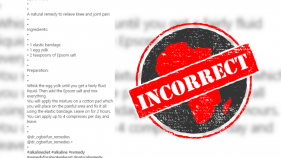
By Motunrayo Joel
“A natural remedy to relieve knee and joint pain,” begins a message posted on Facebook in Nigeria.
It claims a mixture of egg yolk and Epsom salt will ease this pain.
“Whisk the egg yolk until you get a fairly fluid liquid. Then add the Epsom salt and mix everything. You will apply the mixture on a cotton pad which you will place on the painful area and fix it all using the elastic bandage. Leave on for 2 hours. You can apply up to 4 compresses per day and leave.”
Epsom salt, also called magnesium sulphate, is a chemical compound of magnesium, sulphur and oxygen. It is a bitter crystalline substance that’s either colourless or white.
But can this combination be used to treat knee or joint pain?

Not scientifically proven
Knee pain is a common condition. There are many causes, ranging from injury to some kind of arthritis. Arthritis is inflammation in the joints.
There are several medical treatments for knee and joint pain, depending on the cause.
“I recently stumbled on the claim but just ignored it. It makes no sense to me,” Chike Anibeze, a professor of anatomy at Nigeria’s Enugu State University College of Medicine, told Africa Check.
Anibeze said he had not seen any research into joint pain being treated with egg yolk and Epsom salt.
“The ingredients do not affect knee or joint pain. My advice to anyone battling this pain is to visit a doctor. The doctor will need to establish the cause of the pain before prescribing treatment.”
Mr. Olaleye mentioned some of the defaulting states to include Benue, Cross River, Ekiti (which only implemented levels one to six with backlogs of arrears on promotion), Enugu, Gombe, Imo, Kogi, Kwara, Nasarawa, Ogun (with huge remittance on deductions), Oyo, Plateau, Rivers, Taraba, Kano, and Zamfara. It would appear that these state governors had no intention of fulfilling their obligations arising from the agreement; an attitude that leaves a poor reflection and further depicts these state executives as insensitive to the plight of the poor masses.
Nigerians are tired of the readily churned-out excuse on the inequality of federal allocations and or how the fortunes of the states haven’t fared well with the global drop in crude oil prices. While this may be so, the fortunes of the average Nigerian hasn’t fared any better, if one thing is certain, it is that living condition of workers has deteriorated. Perhaps when placed in proper perspective, these state executives would get a glimpse of the hardship faced by the average civil service employee on a daily basis.
Within the period, Nigerians have had to deal with the increase in electricity tariffs, and in the absence of prepaid meters, many have had to pay as much as N20, 000 a month for power not supplied let alone consumed. The pronounced instability of power supply has thus forced the average Nigerian to resort to the use of power generators. And with the increase in the pump price of PMS, the monthly cost of petrol to power a generator for an average household is outrageous. The cost of housing, transportation, and particularly food commodities has equally been on a steady rise, particularly with the herdsmen/farmers crisis, which has kept most farmers away from their farms. In spite of these, Nigerians have had to deal with the harsh economic effects of the lockdown that was occasioned by the coronavirus pandemic. An N30, 000 minimum wage, which is less than $100, is far from being luxurious pay as it’s barely sufficient to cater to the needs of an average Nigerian home considering the prevailing economic conditions.
While the governors would be quick to cite paucity of funds, it should be noted that the fortunes of most of these states are made worse with the increase in the number of political appointees, often made to serve as compensation for the support received during elections. Worst still is the exorbitant amounts paid to former state executives as pension and other allowances, which often run into hundreds of millions of naira and serve as a drain on state finances. In spite of persistent complaints and condemnation of these practices by Nigerians, political office holders continue to appropriate huge monetary sums for their upkeep, while the average civil service employee is expected to patiently wait on the improvement of state finances before their basic wages could be met. Workers are indeed going through the pains of building the nation in different ways.
It is necessary to reiterate that a total dependence by many states on federal allocations has never been and will never be a way out. The nation should strive for fiscal federalism, and grant states the power to harness resources in their domain and pay royalties to the central government. Ultimately such arrangement will evolve into states formulating their individual minimum wage that will be reasonable and reflective of their economic status.
State governors should however be more creative in their approach to revenue drive. Most states are non-viable today simply because over time, successive governments had failed to improve on capital infrastructures as would enable the growth of small and medium scale industries that could contribute to their internally generated revenues. The primary purpose of government is the security and welfare of the people and a government that is unable to pay the minimum wage of its workforce has failed in its responsibility and undeserving the support of the people.
END

Be the first to comment